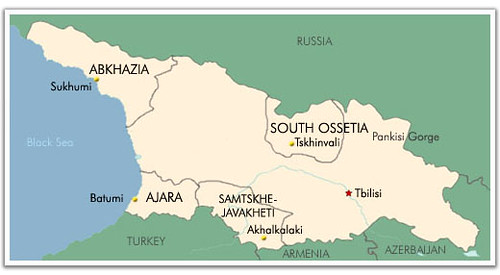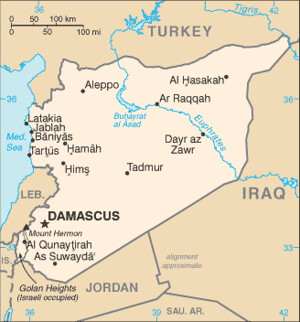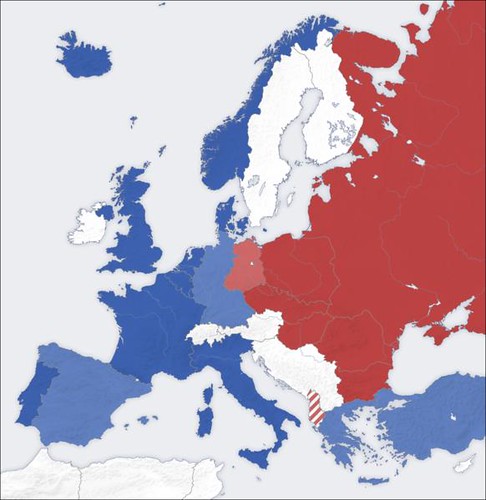The only red state that REALLY matters
When the Soviet Union imploded, there were hundreds of theories of what would happen to the land and people it used to consist of. One idea was that, since the USSR contained something along the lines of 500 distinct ethnic groups, the term "Balkanization" would be changed to "Transsiberification" as the once-monolithic nation dissolved into 500 tiny and constantly warring city-states (or, further east, hamlet-states). Though skeptical, I was a huge fan of this theory. It meant job security for a young Slavophile.
The Chechen rebellion was supposed to be the snowflake that started the avalanche, but seeing the writing on the wall, the Russians refused to let them go easily and answered their guerrilla insurgency with a conscripted conventional force with superior firepower and numbers, a strategy that worked out so well for them in Afghanistan in the 1980s, heh heh heh. Seriously, despite my sarcastic jab, this approach towards the Chechens wasn't pretty but it worked: a nasty, vicious war that has killed more civilians than combatants and is still in progress. Not exactly an encouraging example to any other restless ethnic would-be rebels. The lesson to the other former Soviet republics is simple: be as excessively brutal as possible when faced with a separatist movement, and everything will be ok. At least, your political borders will be.
Oddly enough, the one former Soviet republic not to take this lesson to heart is Georgia, birthplace of Josef Stalin. Back in 1993, two separatist groups won de facto independence from Georgia: Abkhazia and South Ossetia, which managed this through a mixture of tenacity, remarkable fighting ability, drawing allies from elsewhere in the region, and support from Russia. Yes, you read that correctly! Russia did actually work towards destabilizing one of its own former client states. This is because Georgia is predominantly a pro-Western state and thus, doesn't always row in sync with Russia--Georgia has even been known to allow Chechen rebels to enter the country to rest and rearm. Now, tensions are rising again between South Ossetia and Georgia, and Abkhazia is responding to this development by massing soldiers on its border with Georgia, very likely at the prodding of Russia.
remarkable fighting ability, drawing allies from elsewhere in the region, and support from Russia. Yes, you read that correctly! Russia did actually work towards destabilizing one of its own former client states. This is because Georgia is predominantly a pro-Western state and thus, doesn't always row in sync with Russia--Georgia has even been known to allow Chechen rebels to enter the country to rest and rearm. Now, tensions are rising again between South Ossetia and Georgia, and Abkhazia is responding to this development by massing soldiers on its border with Georgia, very likely at the prodding of Russia.
[Long Editor's Note: In addition to those reasons listed above, the Georgian military is plagued with widespread incompetence. To illustrate this, earlier this week there were reports of gunfire at a Georgian army base. Responding to questions as to whether this was politically motivated, the Georgian ambassador responded that the shooting was started by 10-15 conscript soldiers under the influence of alcohol. It reminds me of the time when an old classmate of mine had burned half his high school down, and was visited at home by the police for questioning. His airtight alibi? That he couldn't have committed arson that day because he'd skipped school to stay home, drink vodka, and snort cocaine.]
Now, consider what happened at the United Nations yesterday: Georgian President Mikhail Saakashvili claimed, before the General Assembly, that on September 20th Georgian forces had detained a group of militants led by a Russian Colonel in the mountains just across the border from Abkhazia. Saakashvili pointedly asked just what the hell the Russians thought they were doing? The Russian reponse came from Foreign Minister Sergei Lavrov, who claimed that the Russians were on an anti-terrorism excercise, and that after surrendering their arms to the Georgians, two Russian officers were savagely executed.
Interesting that the Russians would wait a week to announce this fairly significant incident. Either they just found out about it, or they are lying and just want to raise the stakes. Either way, their options are limited, now: either they let Georgia believe it's ok to execute their officers, or they throw down. It's reminiscent of that one time a certain presidential administration cited the presence of WMDs as cause for intervention. Hmmmm. In any case, if Russia really is planning to move on Georgia, it knows this is the perfect time. With America tied down in Iraq, it's in no position to help out its ally.
The Chechen rebellion was supposed to be the snowflake that started the avalanche, but seeing the writing on the wall, the Russians refused to let them go easily and answered their guerrilla insurgency with a conscripted conventional force with superior firepower and numbers, a strategy that worked out so well for them in Afghanistan in the 1980s, heh heh heh. Seriously, despite my sarcastic jab, this approach towards the Chechens wasn't pretty but it worked: a nasty, vicious war that has killed more civilians than combatants and is still in progress. Not exactly an encouraging example to any other restless ethnic would-be rebels. The lesson to the other former Soviet republics is simple: be as excessively brutal as possible when faced with a separatist movement, and everything will be ok. At least, your political borders will be.
Oddly enough, the one former Soviet republic not to take this lesson to heart is Georgia, birthplace of Josef Stalin. Back in 1993, two separatist groups won de facto independence from Georgia: Abkhazia and South Ossetia, which managed this through a mixture of tenacity,
 remarkable fighting ability, drawing allies from elsewhere in the region, and support from Russia. Yes, you read that correctly! Russia did actually work towards destabilizing one of its own former client states. This is because Georgia is predominantly a pro-Western state and thus, doesn't always row in sync with Russia--Georgia has even been known to allow Chechen rebels to enter the country to rest and rearm. Now, tensions are rising again between South Ossetia and Georgia, and Abkhazia is responding to this development by massing soldiers on its border with Georgia, very likely at the prodding of Russia.
remarkable fighting ability, drawing allies from elsewhere in the region, and support from Russia. Yes, you read that correctly! Russia did actually work towards destabilizing one of its own former client states. This is because Georgia is predominantly a pro-Western state and thus, doesn't always row in sync with Russia--Georgia has even been known to allow Chechen rebels to enter the country to rest and rearm. Now, tensions are rising again between South Ossetia and Georgia, and Abkhazia is responding to this development by massing soldiers on its border with Georgia, very likely at the prodding of Russia.[Long Editor's Note: In addition to those reasons listed above, the Georgian military is plagued with widespread incompetence. To illustrate this, earlier this week there were reports of gunfire at a Georgian army base. Responding to questions as to whether this was politically motivated, the Georgian ambassador responded that the shooting was started by 10-15 conscript soldiers under the influence of alcohol. It reminds me of the time when an old classmate of mine had burned half his high school down, and was visited at home by the police for questioning. His airtight alibi? That he couldn't have committed arson that day because he'd skipped school to stay home, drink vodka, and snort cocaine.]
Now, consider what happened at the United Nations yesterday: Georgian President Mikhail Saakashvili claimed, before the General Assembly, that on September 20th Georgian forces had detained a group of militants led by a Russian Colonel in the mountains just across the border from Abkhazia. Saakashvili pointedly asked just what the hell the Russians thought they were doing? The Russian reponse came from Foreign Minister Sergei Lavrov, who claimed that the Russians were on an anti-terrorism excercise, and that after surrendering their arms to the Georgians, two Russian officers were savagely executed.
Interesting that the Russians would wait a week to announce this fairly significant incident. Either they just found out about it, or they are lying and just want to raise the stakes. Either way, their options are limited, now: either they let Georgia believe it's ok to execute their officers, or they throw down. It's reminiscent of that one time a certain presidential administration cited the presence of WMDs as cause for intervention. Hmmmm. In any case, if Russia really is planning to move on Georgia, it knows this is the perfect time. With America tied down in Iraq, it's in no position to help out its ally.



